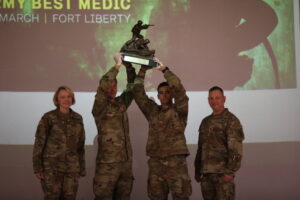
Story by Ronald Wolf
U.S. Army Medical Command
Fort Liberty, NC (March 8, 2024) — The 2024 Command Sgt. Maj. Jack L. Clark, Jr., U.S. Army Best Medic Competition was held from March 4-8, at Fort Liberty, North Carolina. This year’s winners are Staff Sgt. Patrick Murphy, 75th Ranger Regiment, and Staff Sgt. Ryan Musso, 75th Ranger Regiment, both of Hunter Army Airfield.
The Army Best Medic Competition is a two-Soldier team competition that physically and intellectually challenges the Army’s best medics in a three-day event that includes a realistic simulated operational environment. The Competition pushes Soldiers to their limits to test their tactical and technical operational medicine capabilities — the skills required to bring the injured, ill , or wounded Warfighter home. More than 50 competitors squared off in teams of two for this year’s competition.
“This is about our Soldiers having combat ready care on the battlefield [in order] to be the most lethal force,” said Lt. Gen Mary K. Izaguirre, Surgeon General of the Army and Commander, Army Medical Command, at the finish of the mystery event. “[Soldiers] are going to need everything we ask of you.”
The course tests medical skills and physical capabilities. However, the rigor prepares medics for combat deployments or any other demanding assignment the medics needs to do.
The competition is designed to simulate a realistic environment that includes emerging threats and to represent real-world combat conditions.”
“This competition makes me want to train harder,” said Musso. “To bring my [Soldiers] up to the level where we had to be over the last few days.” The hardest part was pushing himself farther than he had before.
Examples of events were foot marches, prolonged field care, weapons qualifications, day and night land navigation, knowledge test, and a mystery event and of a series of tasks the medics might face on the battlefield.
“Really glad to see all the hard work paid off,” said Murphy. “The hardest event for me was the dragging the Skedco for more than two miles.”
Command Sgt. Maj. Timothy Sprunger. said to the competitors at the conclusion of the final event, “We were here to find the best of the best. Congratulations.”
The competition allows competitors to further their skills. They serve as the first line of care for injured, ill, or wounded Soldiers and ensures medical readiness. Army medics must be ready when called upon to deploy, fight, and win in combat.
“They put it all out there,” said Sprunger. “They did a great job.”
The Command Sgt. Maj. Jack L. Clark, Jr. Army Best Medic Competition is dedicated to the 13th Command Sergeant Major of the U.S. Army Medical Command. Clark was one of the most respected leaders and noncommissioned officers in the history of the command who understood the important role of medics in the Army and the trust Soldiers and leaders of units in combat must have in the Army Medical Department.
The Competition is open to all active duty, Army National Guard, and Army Reserve medical soldiers who have earned the competitive Combat Medical Badge or Expert Field Medical Badge.
Both Musso and Murphy agreed that future medics considering the competition should, “put themselves in really hard situations and force themselves to not quit.”